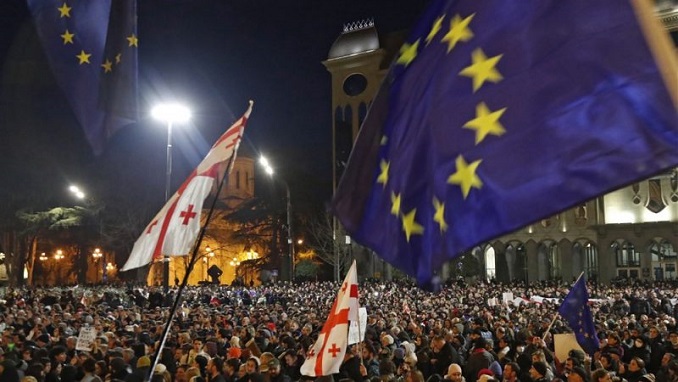Describing it as a very bad development in Georgia that could seriously affect its ties with the European Union, the bloc’s foreign policy chief Josep Borrell condemned Georgian controversial draft law on ‘foreign agents’.
Borrell said in a written statement on Tuesday that the bill on transparency of foreign influence was a very bad development for Georgia and its people.
After applying for EU membership together with Ukraine and Moldova after Russia invaded Ukraine on February 24, 2022, Georgia was granted formal candidate status in June last year along with Kyiv and Chisinau, but EU leaders pointed out that Tbilisi must implement a number of reforms first.
At least 80%of the population in Georgia, according to opinion polls, supports the country’s plans to join NATO and the EU, which are enshrined in Georgia’s constitution.
After Georgian lawmakers earlier Tuesday gave their initial backing to the draft “foreign agents” law which critics have said represents an authoritarian shift in the country, Tbilisi has turned into a scene of protests that started a week ago, when protesters disrupted committee hearings in the Georgian parliament.
As thousands of demonstrators took to the streets in the capital, Georgian police used tear gas and water cannon against protesters, some of which, according to television footage, threw a Molotov cocktail at a cordon of riot police.
Previously on Tuesday, Georgia lawmakers were urged by Human Rights Watch and Amnesty International to rebuff the controversial law that, according to the NGOs, will seriously impact freedoms.
The watchdogs described the law in their statement as incompatible with international human rights law and standards that protect the freedom of expression and association rights.
Noting that the legislation raised questions about Georgia’s ruling party’s – which supports the bill- commitment to Euro-Atlantic integration since it was incompatible with the country’s desire to join the EU, the US embassy in Georgia called Tuesday a dark day for Georgia’s democracy.
The embassy called the bill “Kremlin-inspired”, likening it to a 2012 Russian law that allows Moscow’s authorities to act against NGOs, media outlets, and others deemed “foreign agents”.
The perceived backsliding on democracy is seriously damaging Tbilisi’s ties with Brussels in recent years with Georgian authorities facing mounting international criticism.



